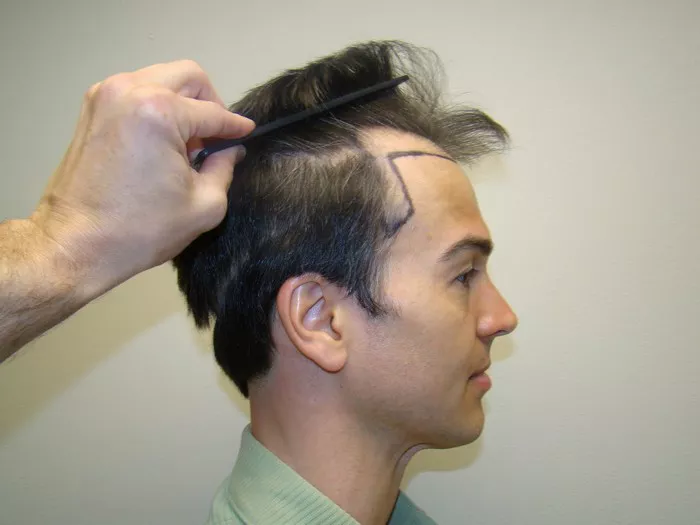Hair transplant surgery has become a popular solution for those experiencing hair loss. However, not everyone is an ideal candidate for this procedure. Understanding who may not benefit from a hair transplant is crucial for setting realistic expectations and avoiding potential disappointments. This article explores the various factors that can make someone a poor candidate for hair transplant surgery.
Understanding Hair Transplant Surgery
Hair transplant surgery involves moving hair follicles from one part of the body, typically the back or sides of the head (known as the donor area), to the balding or thinning areas (the recipient area). There are two main types of hair transplant techniques: Follicular Unit Transplantation (FUT) and Follicular Unit Extraction (FUE). While FUT involves removing a strip of scalp and dissecting it into individual follicular units, FUE involves extracting individual follicles directly from the scalp.
General Contraindications
Certain medical conditions, medications, and overall health issues can make hair transplant surgery unsafe or ineffective. Here are some general contraindications:
1. Active Scalp Infections
Patients with active infections or chronic scalp conditions such as folliculitis, psoriasis, or seborrheic dermatitis should avoid hair transplant surgery until these conditions are adequately treated and controlled. Performing surgery on an infected or inflamed scalp can lead to poor healing and complications.
2. Blood Clotting Disorders
Individuals with blood clotting disorders or those on anticoagulant medications may face increased risks during and after surgery. Such conditions can lead to excessive bleeding and complications in wound healing.
3. Uncontrolled Chronic Illnesses
Patients with uncontrolled diabetes, hypertension, or other chronic illnesses may not be ideal candidates until their conditions are stabilized. Poorly controlled health issues can negatively impact surgical outcomes and recovery.
4. Autoimmune Diseases
Autoimmune diseases like lupus or alopecia areata can cause unpredictable hair loss patterns. In such cases, hair transplant surgery might not yield satisfactory results as the immune system could attack the transplanted hair follicles.
Poor Donor Hair Quality
A critical factor for a successful hair transplant is the availability of healthy donor hair. If the donor hair is sparse, thin, or of poor quality, achieving a satisfactory result becomes challenging.
See Also: What is ARTAS Hair Transplant: A Comprehensive Guide
1. Diffuse Hair Loss
Individuals with diffuse unpatterned alopecia (DUPA) have hair thinning all over the scalp, including the donor area. This widespread thinning makes it difficult to harvest sufficient healthy follicles for transplantation.
2. Low Hair Density
Patients with naturally low hair density in the donor area may not have enough hair to cover the balding areas effectively. Transplanting too few follicles can result in a patchy or unnatural appearance.
Unrealistic Expectations
Managing patient expectations is a critical aspect of any cosmetic procedure. Hair transplant surgery is no exception.
1. Expecting Immediate Results
Hair transplant surgery requires patience. It can take several months for the transplanted hair to grow and achieve noticeable density. Patients expecting immediate results may be disappointed.
2. Desiring Full Restoration of Youthful Hair
Some patients may have unrealistic expectations about achieving the full, thick hair they had in their youth. Hair transplant surgery can improve hair density, but it may not completely restore the original hair volume.
Age Considerations
Age can play a significant role in determining candidacy for hair transplant surgery.
1. Young Patients
Young individuals, especially those in their early twenties, might not be ideal candidates. Hair loss patterns may not be fully established, making it difficult to predict future hair loss. Early transplants can result in unnatural hairlines as hair loss progresses.
2. Elderly Patients
While age alone is not a strict contraindication, elderly patients should have realistic expectations regarding the density and longevity of transplanted hair. Other health factors common in older age, such as cardiovascular conditions, might also influence the decision.
Psychological Considerations
Mental health and psychological readiness are essential for the success of cosmetic procedures.
1. Body Dysmorphic Disorder (BDD)
Individuals with BDD might have an unrealistic perception of their appearance and may not be satisfied with the results of any cosmetic surgery, including hair transplants.
2. Unresolved Emotional Issues
Patients seeking hair transplant surgery to solve deeper emotional or self-esteem issues might not find the surgery satisfying. It’s essential to address underlying psychological concerns before undergoing cosmetic procedures.
Financial Considerations
Hair transplant surgery can be expensive, and it often requires more than one session to achieve optimal results.
1. Inability to Afford Multiple Sessions
Patients should be financially prepared for the possibility of needing additional sessions. Inadequate financial planning can lead to incomplete treatment and dissatisfaction with the results.
Lifestyle Factors
Certain lifestyle factors can influence the success and longevity of a hair transplant.
1. Smoking
Smoking can impair blood flow and delay healing. It can also affect the health of transplanted hair follicles, leading to poor outcomes.
2. Poor Diet and Lack of Exercise
A healthy diet and regular exercise promote overall health and well-being, including the health of hair follicles. Poor lifestyle choices can negatively impact surgical outcomes and hair growth.
Conclusion
Hair transplant surgery can offer significant improvements for those struggling with hair loss, but it is not suitable for everyone. Medical conditions, poor donor hair quality, unrealistic expectations, age, psychological readiness, financial preparedness, and lifestyle factors all play critical roles in determining candidacy. Consulting with a qualified hair transplant surgeon is essential to evaluate individual circumstances and make informed decisions about the best course of action for hair restoration.
For those who are not good candidates for hair transplant surgery, other treatments such as medications (e.g., minoxidil and finasteride), laser therapy, or non-surgical hair replacement systems may be more appropriate. By understanding who is not an ideal candidate, patients can better navigate their options and achieve more satisfying outcomes in their journey to address hair loss.


